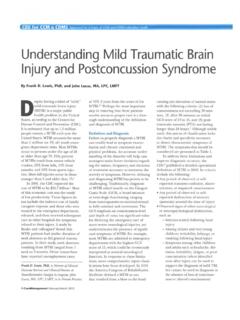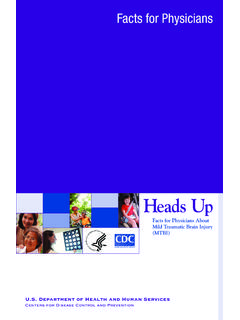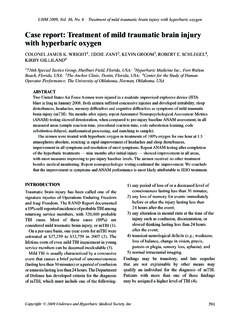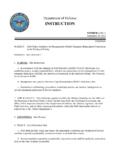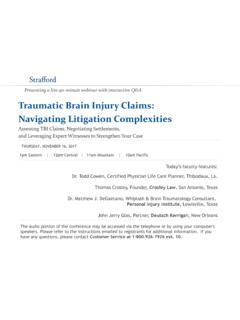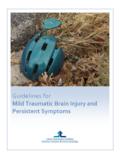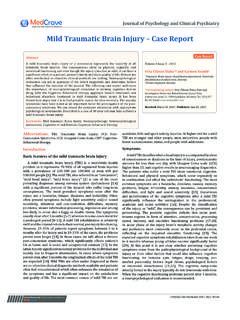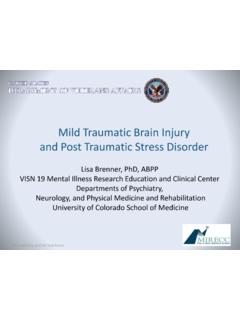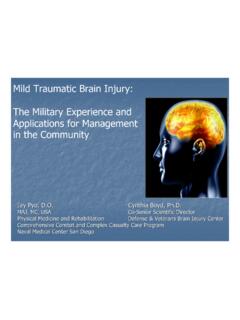Transcription of Mild Traumatic Brain Injury: Neuroendocrine Dysfunction
1 mild Traumatic Brain injury : Neuroendocrine Dysfunction Indications and Conditions for Neuroendocrine Dysfunction Screening Post mild Traumatic Brain injury Objectives Upon completion of this educational module, the learner will be able to: Describe the basic pathophysiology of Neuroendocrine Dysfunction (NED) as it relates to mild Traumatic Brain injury (TBI), including the two primary endocrine glands that are affected during a blast injury Identify at least five symptoms that differentiate NED from persistent mild TBI symptoms Identify at least five laboratory tests used for NED screening post mild TBI. Identify the major criteria for Endocrinology referral among patients with strong suspicion of NED.
2 2. Scope of DCoE. NED Recommendation What it is: The DCoE clinical recommendation described in this educational module is specifically intended for use in the mild TBI patient population, including: Individuals diagnosed with mild TBI with persistent symptoms at least three months post injury (post-concussion syndrome). Individuals who develop symptoms suggestive of Neuroendocrine Dysfunction up to 36 months post injury This educational module is relevant to all health care professionals conducting screening for patients with mild TBI in any Defense Department (DoD) health care setting, including both primary and specialty care.
3 3. Scope of DCoE. NED Recommendation What it is not: The DCoE clinical recommendation described in this educational module is not intended for use for the moderate to severe TBI patient population, and patients with acute endocrine disorders, including adrenal crisis and hypoglycemic coma. This educational module is not relevant to patients seen in an acute inpatient setting, and should not be used for screening other symptoms or disorders of the endocrine system. 4. Introduction The information that follows on the definition, classification, and overall symptom profile of NED is provided: As introductory materials for those who are new to the subject of NED.
4 With an assumption that the reader has principal knowledge of TBI, including assessment, treatment and differentiation between mild , moderate and severe TBI. 5. Neuroendocrine Dysfunction (NED). Background Approximately 233,425 mild TBIs have occurred from year 2000 through Dec 2011 among service members 77 percent are classified as mild TBI. The majority of mild TBI patients have symptoms that last only a short period of time, recovering within minutes to several weeks Approximately 15 percent of patients (among civilian cohorts) with mild TBI experience persistent symptoms Of the approximate 15 percent who experience a mild TBI and remain symptomatic, an estimated 15-30 percent develop NED.
5 7. Definition of NED. The term Neuroendocrine Dysfunction refers to a variety of conditions caused by imbalances in the body's hormone production directly related to the Brain . There are two areas of the Brain responsible for regulating the production of hormones, the hypothalamus and the pituitary gland. Damage to the hypothalamus or pituitary gland caused by TBI (including vascular damage, rupture, Brain swelling, vasospasm, pituitary swelling or inflammation), may impact the production of pituitary hormones and other Neuroendocrine functions of the Brain . 8. TBI-Related NED. NED following TBI is the result of direct trauma ( , coup- contrecoup injury ), or biochemical response to a blast exposure, that interferes with the normal production and regulation of hormones produced by the pituitary gland and the hypothalamus 9.
6 Pathophysiology The most common hormonal deficiencies associated with TBI include: Pituitary deficiencies (TSH/FSH/GH/IGF-1). Gonadotropin deficiencies (LH/FSH/testosterone/estradiol). Adrenocorticotropic hormone, thyroid deficiency and prolactin deficiencies are also seen among patients with Neuroendocrine involvement following TBI. List of Hormones FSH Follicle-Stimulating hormone GH Growth hormone IGF 1 Insulin-like growth factor 1. LH Luteinizing hormone TSH Thyroid-stimulating hormone 10. Hormone Deficiencies Symptoms Growth hormone: Increased abdominal fat mass, fatigue, decreased vigor and concentration, decreased lean body mass, dyslipidemia, anxiety, depression, impaired judgment Gonadotropin: Males infertility, decreased libido, erectile Dysfunction , decreased muscle mass, decreased exercise tolerance, anemia and testicular atrophy.
7 Females amenorrhea, sexual Dysfunction , breast atrophy Corticosteroid: Adrenal crisis, hypoglycemia, hyponatremia, myopathy, anemia, depression, fatigue, anxiety, apathy, weight loss, loss of libido 11. Hormone Deficiencies Symptoms Thyroid hormone: Decreased energy, depression, cold intolerance, weight gain, fatigue, poor memory, muscle cramps, constipation, myopathy, hypotension, bradycardia, neuropathy, skin, hair and voice changes Prolactin: Males decreased libido, impotence. Females amenorrhea, oligomenorrhea, galactorrhea, infertility, hot flashes, vaginal dryness, hirsutism (in post menopausal women). Both sudden onset of depression Antidiuretic hormone: Excessive urination, dehydration, excessive thirst, hypernatremia (potentially leading to weakness, altered mental status, coma, seizures).
8 12. Hormone Deficiencies Symptoms Males & Females Males Females Growth Hormone Increased abdominal fat mass, fatigue, decreased vigor and (GH) concentration, decreased lean body mass, dyslipidemia, anxiety, depression, impaired judgment Gonadotropin Infertility, decreased libido, erectile Amenorrhea, sexual Dysfunction , Dysfunction , decreased muscle mass, breast atrophy (LH/FSH) decreased exercise tolerance, anemia, testicular atrophy Corticosteroid Adrenal crisis, hypoglycemia, hyponatremia, myopathy, anemia, (ACTH) depression, fatigue, anxiety, apathy, weight loss, loss of libido Thyroid-stimulating Decreased energy, depression, cold intolerance, weight gain, fatigue, poor Hormone memory, muscle cramps, (TSH) constipation, myopathy, hypotension, bradycardia, neuropathy, skin, hair, and voice changes Prolactin Sudden onset of depression Decreased libido, impotence Amenorrhea, oligomenorrhea, galactorrhea, infertility, hot flashes, (PRL) vaginal dryness, hirsutism (in post menopausal women).
9 Antidiuretic Excessive urination, dehydration, excessive thirst, hypernatremia Hormone (potentially leading to weakness, (ADH) altered mental status, coma, seizures). 13. Overlap of Symptoms Post-concussion NED. Syndrome Headache Dizziness Loss of libido Fatigue Blurred vision Infertility Poor memory Sleep disturbance Amenorrhea Anxiety Sensitivity to light/noise Loss of muscle mass Depression Balance problems Weight gain/ Increased belly body fat Memory deficits weight loss Low blood pressure Slowed processing Emotional lability Reduced heart rate Impaired judgment Lack of concentration Hair loss Altered executive function Attention difficulties Anemia Agitation Constipation Irritability Cold intolerance Impulsivity Dry skin Aggression 14.
10 Symptoms Suggestive of NED. Behavioral, Emotional and Sleep Related Symptoms Depression Emotional lability Anxiety Fatigue Poor memory Lack of concentration Symptoms Related to Reproductive Function Loss of libido Infertility Amenorrhea 15. Symptoms Suggestive of NED. Somatic Symptoms Loss of muscle mass Hair loss Increased body fat Anemia around the waist Constipation Weight gain/weight loss Cold intolerance Low blood pressure Dry skin Reduced heart rate 16. Screening for NED. NED should be considered in the differential diagnosis during screening for the following: Patients with persistent mild TBI symptoms suggestive of NED that do not resolve after three months from initial injury Patients with onset of new symptoms, suggestive of NED, up to 36.
